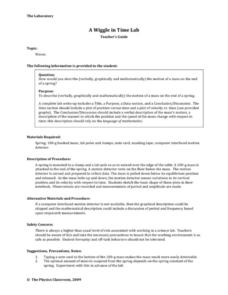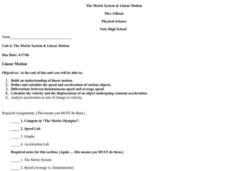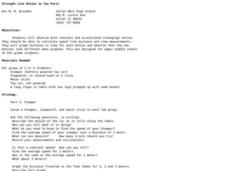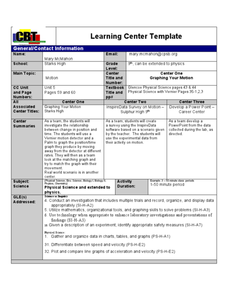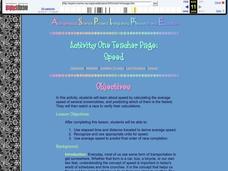PHET
Forces and Motion: Basics
How is tug of war related to pushing a refrigerator? Here's a simulation connects these two activities with Newton's First Law of Motion. Four different simulations allow scholars to explore net force with tug of war, motion with pushing...
Curated OER
Inertial Mass, Weight, and Newton's Second Law of Motion
The stage is set for you to guide future physicists through three forceful activities about motion. In the first, learners experiment with rolling carts to discover how objects interact. In the second, they inspect images of an object in...
Curated OER
Measures of Circular Motion
Physicists become Olympians in a competition using centripetal force. They ride a bicycle to comprehend relationships between linear and rotational motion. If you have an old-fashioned record player, it can be used to help pupils...
Physics Classroom
A Wiggle in Time Lab
Though an alternative method is suggested, the best way to carry out this investigation is with the use of a computer-interfaced motion detector. Physics fanatics hang a mass on the end of a spring and analyze its motion verbally,...
Kenan Fellows
Analyzing Speed from Different Modalities
Show us your moves. Using sensor equipment, scholars track the motion of different movements, such as jogging, skipping, or jump roping. They analyze velocity and acceleration and create graphs representing each movement.
Texas State Energy Conservation Office
Investigation: Acceleration
Take a look at acceleration within the context of automotive technology. They vary the mass on a toy car and run it down a ramp, exploring Newton's second law of motion. Though this is a classic lab activity, you will appreciate the...
Curated OER
Linear Motion
Students are able to build an understanding of linear motion. They are able to define and calculate the speed and acceleration of various objects. Students are able to differentiate betweeen instantaneous speed and average speed. They...
Curated OER
Straight Line Motion in Two Parts
Students describe and quantify the motion of toy cars. In this motion instructional activity, students observe a battery powered toy car on a flat surface and a standard toy car on a sloped surface. They write their observations, measure...
Curated OER
Uniform Motion
Pupils identify when uniform motion occurs. They watch a teacher made PowerPoint explaining the concept of uniform motion and carry out an experiment to understand the concept.
Columbus City Schools
Speed Racers
Who wants to go fast? The answer? Your sixth-grade science superstars! The complete resource offers the ultimate, all-inclusive playbook for mastering the important concepts of speed versus time; distance versus time; and how...
LABScI
Viscosity: The Fluid Lab
There's more to fluids than meet the eye—they include gases, liquids, and polymers, too! Scholars complete three hands-on activities exploring different properties of fluids. They explore viscosity by measuring the resistance, or...
New Mexico State University
Lab 6: Kepler's Laws
A 15-page package thoroughly teaches your physics or astronomy learners about Kepler's three laws of planetary motion. Each one is stated and explained. Class members answer questions, solve problems, and participate in the classic...
Curated OER
"Graphing Your Motion"
Students study the concepts of motion, velocity, and acceleration through graphing their own movement using LoggerPro. They explain the difference between speed and velocity using the weather vane example. They discover the difference...
Curated OER
Motion
Sixth graders read about and study motion. They conduct a lab in which they calculate speed using track records at their school. They graph the results and then invite a guest speaker (an officer from the local police department) who...
Curated OER
Speed
Students explore speed by calculating the average speed of several snowmobiles, and predicting which of them is the fastest. They watch a race to verify their calculations.
LABScI
Harmonic Motion: Pendulum Lab
Several times throughout history, groups of soldiers marching in rhythm across a suspension bridge have caused it to collapse. Scholars experiment with pendulums, resonance, and force to determine why this would happen. First, pupils...
Physics Classroom
Action-Reaction Lab
Computer-interfaced motion detectors are required to carry out this inquiry. It is a new twist on exploring motion with plunger carts: they are set back-to-back and then propelled away from each other. Their velocities are measured, and...
Concord Consortium
Collisions and Kinetic Energy
Can your physical science classes describe what happens when two objects collide? Whether they are new to the study of kinetic energy or just brushing up on their skills, pupils can observe the outcome of a variety of collisions...
STEM for Teachers
Tsunami!
How does the depth of an ocean affect the speed of a tsunami's waves? Use Jell-o, graham crackers, and marshmallows to model the effects of an underwater earthquake and its resulting tsunami. The lesson includes hands-on activities,...
Curated OER
May the Force be with You -- All about Force and Gravity
Here is a fabulous set of teacher's notes that will make your next hands-on gravity and force lab fun and interesting. These notes provide you with three activities that allow children to make and test hypothesis regarding force,...
Edmond Public Schools
8th Grade Science Resource Book: Unit 2 - Physics
Get things moving with this extensive collection of physical science resources. Covering the fundamentals of measurement, graphing, lab safety, and experimental design as well as the specific scientific concepts...
Curated OER
Motion of a Bowling Ball
Students experiment with distance, speed, and motion by graphing the motion of a bowling ball. In this distance versus time graphing lesson, students observe the speed and distance of a rolling ball and graph their findings. They then...
Curated OER
Straight Line Motion with a Stomper
Students explore average speed, and graph distances and time. In this speed and velocity lesson students complete a lab then calculate distances, acceleration and velocity and graph the data.
Curated OER
Investigating Motion
Pupils explore types of motion. In this motion experiment, students observe how objects move. Pupils work in small groups to discover the laws of motion.





